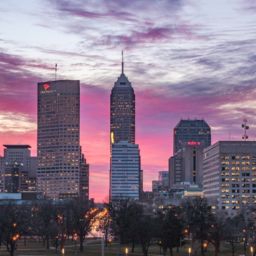

The road to becoming an athlete is anything but conventional. Sometimes it’s paved smoothly, other times it feels like you’re on loose gravel, and finally, there are days when you’re just trying to avoid potholes at all costs. Portia Bailey-Bernard took her athletic aptitude and vision of the road ahead and translated it into the future of economic development for Indianapolis.
Growing up in Central Indiana, Portia was a standout athlete with a loving, supportive family. As a first-generation college student, Portia earned her degree at Indiana University, along with a varsity letter in track and field. She credits her athletic endeavors with helping to prepare her for future success.
“When you’re forced to balance so many different priorities like schoolwork, practice, a social life, you realize you can always push yourself to achieve more. There’s something about the competitive drive that sets student-athletes up for success as professionals,” Portia explains.
As a former student-athlete, Portia’s no stranger to having all eyes on her, and she credits that experience with helping her learn to keep her cool at the negotiating table, on camera, and everywhere in between. In her hometown of Fishers after graduation, Portia got her first taste of government work by serving as a project manager for the city’s increasing economic development investments. Three short years later, she earned her Juris Doctor summa cum laude from Indiana University’s Robert H. McKinney School of Law.
After a few years working as an attorney, Portia switched gears to help lead the economic development efforts for the City of Indianapolis and Marion County with the Indy Chamber, where she is now Senior Vice President of Indianapolis Economic Development. Portia views her role as much more than development — it’s about establishing an equitable quality of life for all in the city and community she was raised.

“Our work is not just about the increase in production of goods or finding a developer to add to our skyline,” shares Portia. “Economic development measures all change that occurs in terms of economy, education, technology, health, infrastructure, as well as the prosperity of our community. Indianapolis is my home, and as a downtown resident, I get excited for new places to enjoy with my family and friends because growing up, I remember the effect those memories had on me.”
Since joining the Chamber two years ago, Portia’s voice has been heard from panels with the city’s business leaders or in the field with site selectors. She now has a seat at the table and in the decision-making process for changes affecting everyone in the city she cares for. Portia’s experience from the private sector means she’s got an insider view on what makes a great economic investment and how the city can benefit beyond just dollars and cents — like with the City of Indianapolis’s inclusive incentive policy, for example:
“The Indianapolis Inclusive Incentives strategy leads to the creation and retention of good and promising jobs, prioritizes better training and education, improves access to support services and quality education, all while eliminating persistent racial disparities in access to a better-quality life,” says Portia.
Focusing on the quality of life of the people and the city around you makes it easy to lose track of your own checkpoints on the road. And after years of being a varsity and Big Ten athlete, Portia didn’t expect to experience pain so excruciating she at times found it difficult to walk. The answer? Lupus, a chronic lifelong auto-immune disease that attacks the body’s healthy tissue, resulting in pain and inflammation.
“Before then, I would take my health for granted, never thinking I could possibly experience lupus flare-ups that would derail my ability to move,” says Portia. “We often don’t think about how grateful we are for our health until it’s negatively impacting us. Without my family and support system, the everydayness of lupus would overwhelm me.”

Then in 2020, Portia and her husband looked forward to welcoming their first child, but getting there came with more scares than expected. After receiving a preeclampsia diagnosis, she and her husband Nolan welcomed their daughter Maxwell, or “Max.” This second health crisis made Portia realize even more how precious her health and ability to access quality care were to her growing family.
“Mothers are supposed to be the nurturers and caregivers, so when we can’t complete that basic function, we make excuses for ourselves and our pain. Often women make light of what we feel in order to continue with the routine,” Portia reflects.
With the help of her supportive family, Portia persevered, and she and her daughter and husband settled in the Mapleton-Fall Creek area of Indianapolis. Carrying gratitude for her family and city who made her the resilient woman she is today, Portia is the ideal person to help advocate for a better Indianapolis. After speaking with her, it’s clear that she takes the opportunity before her seriously:
“As community leaders, we’re in charge of thinking about how future generations will interact with the core of downtown, especially with the redevelopment of Circle Centre. I think about my childhood and the community programming I experienced, and I want to create that for my daughter. Being able to say you have a hand in something that people will enjoy for generations to come is incredibly meaningful.”
Portia’s impact on her community may not be fully seen for years, but that doesn’t stop her from pushing boundaries now to make Indianapolis better for business and for people. And at the end of the day, Portia is grateful for all of it.
“On my worst day, I come home to a healthy family, a beautiful home where everything is stable, and when they weren’t always that way, it serves as a great reminder to be appreciative of what we have.”
Created in partnership with Indy Chamber.
Natalie Derrickson is a writer and communications strategist who will always bet on the grit within Indiana’s communities. You can connect with her on Instagram, Twitter, LinkedIn, and her website.
All of our content—including this article—is completely free. However, we’d love it if you would please consider supporting our journalism with an Indy Maven membership.



















